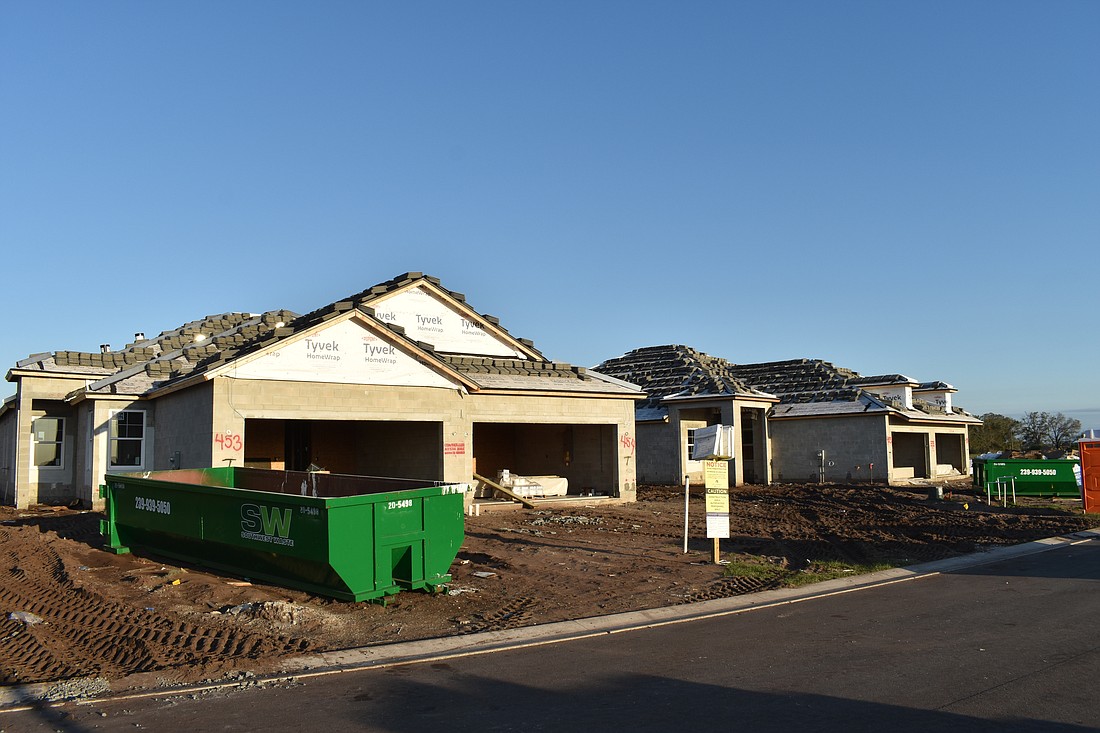- July 26, 2024
-
-
Loading

Loading

It was a limitation that often had District 5 Commissioner Vanessa Baugh scratching her head.
She didn’t understand why builders were limited to the number of speculative homes they could build in their new community.
Speculative homes are homes that are built without having buyers in place. For example, if the builder had been approved to build 300 homes in a new neighborhood, it might be so confident that it would build 50 homes without actually having any sold any.
Those homes would be move-in ready and connected to water, sewer and gas.
In the past, builders would have to apply for the permits for each home as it was sold. And speculative homes, except for model homes, couldn’t be built.
Manatee County Spokesman Bill Logan forwarded information from Manatee County Deputy Administrator Courtney De Pol about speculative homes.
“Speculative homes have never before been defined in the Land Development Code,” De Pol wrote. “When builders would build speculative homes (also known as inventory homes), they would follow the model home process, which requires a temporary use permit.
“In the Land Development Code, it stipulates that ‘no more than 10% of all units or a maximum of 10 units within the development or approved construction phase may be allowed as model homes.’”
On Jan. 19, Manatee County commissioners removed any limit on speculative homes that could be built within an approved project.
According to De Pol, “If a developer applies for a building permit for a speculative home, they will receive a temporary certificate of occupancy upon the (building’s completion and the inspection’s completion). A certificate of occupancy will not be issued until the final plat has been approved.”
Baugh said not allowing speculative homes simply didn’t make sense. She explained that in today’s climate, a builder could complete the homes with today’s inflation instead of a possible rise in inflation in the future.
She also noted that if home buying slows with the economy, building speculative homes could keep workers employed.
All the commissioners responded favorably to the decision to remove the restrictions, calling them unnecessary and burdensome.
“I think this is a pretty significant move in the right direction, to repealing some unneeded regulations,” said District 1 Commissioner James Satcher. “I see the big benefit being to citizens — to people that are trying to move, because I see the posts saying, ‘My home was supposed to be ready in October, but now they’re saying until April.’”
He said it was better to have more options available to the public.
“If (developers) are willing to put their neck on the line and build those homes before it’s all finalized, it just makes a lot of sense to me, so I’m glad this is coming today.”
At-large Commissioner George Kruse said he did not know why the item had existed in the county’s Land Development Code in the first place.
“The fact that we have to come here and remove this stuff is crazy,” Kruse said in a Dec. 15 discussion of the topic. “If someone wants to build additional speculative homes, build them. Why are we restricting this?”
With the population boom in Manatee County, it will be an important tool for builders.
“There is a need for developers to construct, if you will, a stock of homes so they have them ready to be sold, or finished, and sell,” said Bill O’Shea, a principal planner with the Manatee County.
The speculative homes involved in this change will still be limited to single-family residential buildings.
As supply shortages started during COVID-19, O’Shea said developers began to desire a stock of homes that would be available for customers.
There are some protections in place for homes to qualify for this status, said Rob Wenzel, Manatee County’s planning section manager. He said these include a preliminary plat, a final site plan and construction drawings.
The homes cannot be sold until after the plat is approved.
O’Shea said there are some potential issues, such as the possibility of the structure not aligning with the plat once it is completed. In cases such as this, he said, some changes would have to be made in the field, and it could theoretically result in the physical removal of a home.
In building a speculative home, developers would be proceeding at their own risk, O’Shea said, and would sign an agreement holding the county harmless for those units.
Nonetheless, he said it would be a significant benefit to developers in the county. It would allow them the opportunity to take advantage of times when their materials are available, as well as times when they have employees already on site.
Wenzel said the change would remove a burden from county staff as well; while staff members personally track all temporary use permits to ensure they do not pass their expiration date, this is not necessary with speculative homes, as they will not have any occupants.
Wenzel said there are other important differences from the model home definition. Since model homes operate with a temporary use permit, they are used temporarily for purposes such as offices or model collections of finishes.
Speculative homes are building stock that has no immediate use, O’Shea said.
Wenzel said it made more sense to permit the spec homes separately, because model homes tend to be constructed in a central location to comply with requirements, such as a temporary parking lot.
He said that while the model homes have a temporary certificate of occupancy, this would not be the case for speculative homes.
“You can’t just bring the general public out there and let them start touring spec homes,” Wenzel said.